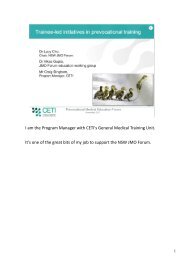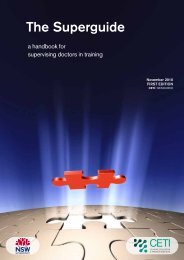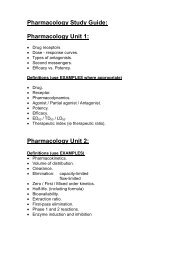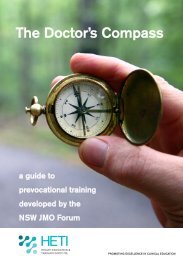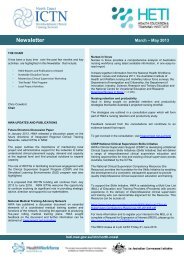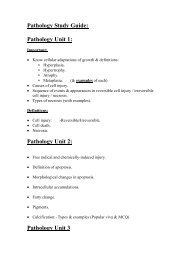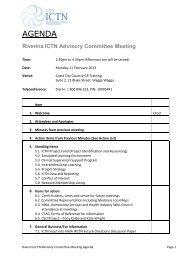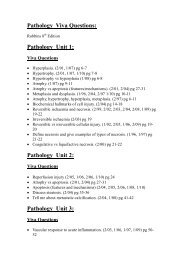Network principles for prevocational medical training - HETI
Network principles for prevocational medical training - HETI
Network principles for prevocational medical training - HETI
Create successful ePaper yourself
Turn your PDF publications into a flip-book with our unique Google optimized e-Paper software.
Trainee assessment<br />
Workplace-based assessment: As far as possible, assessment should be based on real work<br />
activities, or accurate simulation of work activities. The goal of <strong>for</strong>mative assessment is to give<br />
trainees feedback that will help them improve their real-world per<strong>for</strong>mance. The goal of summative<br />
assessment is to measure their level of per<strong>for</strong>mance in actual clinical practice.<br />
Workplace-based assessment can be unstructured, based on general observation of work activity,<br />
but there is evidence that repeated, specific, structured assessments (eg, mini clinical examinations,<br />
direct observation of procedural skills) is more reliable.<br />
Trainee observation by supervisors: The key to meaningful assessment is direct observation<br />
of trainee per<strong>for</strong>mance. Term supervisors are charged with the responsibility to assess trainee<br />
per<strong>for</strong>mance. They can and should talk to other members of the clinical team about the trainee,<br />
seeking their observations and opinions, but this cannot be a substitute <strong>for</strong> direct observation.<br />
Self-assessment: Self-assessment was introduced as a <strong>for</strong>mal component of <strong>prevocational</strong><br />
assessment with the new progress review <strong>for</strong>ms in 2009 after consultation (especially with trainees)<br />
indicated that this was desirable. Doctors must be able to recognise their strengths and limitations<br />
if they are going to provide safe and effective patient care. Skill in self-assessment is fundamental<br />
to self-directed continuing <strong>medical</strong> education, which in turn is essential <strong>for</strong> maintaining competence<br />
and improving professional practice throughout a clinical career.<br />
DPETs and supervisors can encourage self-assessment by:<br />
• z modelling self-awareness and reflective practice themselves<br />
• z inviting trainees to comment on their own per<strong>for</strong>mance and using trainee self-assessment as<br />
the starting point of dialogues about per<strong>for</strong>mance (“How do you think you went with that?”)<br />
• z asking to see trainee logbooks, journals or other written evidence of reflective practice.<br />
Team-based assessment: Term supervisors should seek the opinion of other team members about<br />
the per<strong>for</strong>mance of trainees and use this in<strong>for</strong>mation to augment their own observations.<br />
Team-based assessment works best in clinical teams that practise open communications and<br />
mutually respectful professional discourse.<br />
Term orientation: For assessment purposes, Term Supervisors should arrange (at least) three<br />
meetings with each <strong>prevocational</strong> trainee in each term. The first of these occurs at term orientation in<br />
week 1, when the Term Supervisor reviews the term description with the trainee and discusses:<br />
• z the major focus and goals of the clinical unit and the expectations of the trainee’s role<br />
• z term learning objectives and skills <strong>training</strong> goals<br />
• z supervision needs and the process of per<strong>for</strong>mance assessment<br />
• z the trainee’s current level of knowledge and experience (the trainee should be invited to show<br />
evidence, and an individual learning plan <strong>for</strong> the term should be developed).<br />
Mid-term <strong>for</strong>mative appraisal: <strong>HETI</strong> asks that trainees and term supervisors complete a midterm<br />
<strong>for</strong>mative appraisal <strong>for</strong>m in week 5 of each <strong>training</strong> term. The trainee completes their written<br />
self-assessment be<strong>for</strong>e meeting with the Term Supervisor. Self-assessment provides a basis <strong>for</strong><br />
discussing progress and planning the future direction of <strong>training</strong> during the term. The trainee is<br />
asked to outline personal strengths and achievements and identify weaknesses or needs <strong>for</strong> further<br />
development. The Supervisor then offers feedback in the same manner, and completes their written<br />
appraisal of the trainee.<br />
There is no pass or fail mark in <strong>for</strong>mative assessment, but if per<strong>for</strong>mance problems are identified in<br />
8



